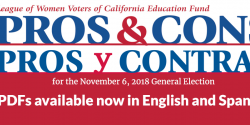Proposition 10: Expands Local Governments’ Authority to Enact Rent Control on Residential Property.
Should the current state law that limits the scope of city and county rent-control ordinances be repealed, thereby allowing cities and counties more authority to limit the rental rates that residential property owners may charge for new tenants, new construction, and single-family homes?
Thirty years ago 14 cities, mostly in the highly populated parts of California, adopted rent control ordinances designed to limit the amounts and frequency with which landlords could increase rents to their existing tenants.
In 1995 the state legislature adopted the Costa Hawkins Rental Housing Act. This law limited the ordinances so that the rent on single family homes and buildings first rented out in 1995 or later could not be controlled; and landlords could raise rent to market rates if a tenant left the rental property.
Court decisions determined that limits on rent increases must not be so low that landlords do not receive a “fair rate of return” on their investments. In other words, the landlords must be allowed to raise rent enough to receive some profit each year.
Renters in California pay 50% more than the national average. About 20% of Californians live in cities that have rent control. In the last two years more cities are seeking to establish rent control ordinances. So far two have done so. Other cities placed rent control initiatives on their local ballots that did not pass.
This proposition repeals the Costa Hawkins Rental Act. It allows cities and counties to regulate rents for whatever type of housing property they choose, no matter when it was built or what type of building it is. It does not change existing rent control laws. It does not create rent control laws. The proposition retains the landlord’s right to a fair rate of return on their investment.
The fiscal impact of this proposition is difficult to predict because it depends upon the content of any rent control ordinances adopted and upon the reaction of landlords and tenants to them. If rent control is expanded it is likely that landlords will reduce the amount of rental housing offered, the value of rental housing decreases, some renters will pay less for rent, and landlords have less income from rental housing. There will be impact on property, sales, and income tax revenues. Overall, the impact on state and local governments will be reduced revenue in the tens to hundreds of millions of dollars each year. The losses could be less or more.

